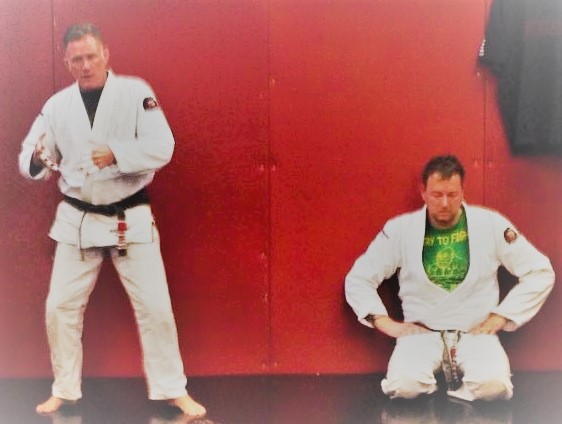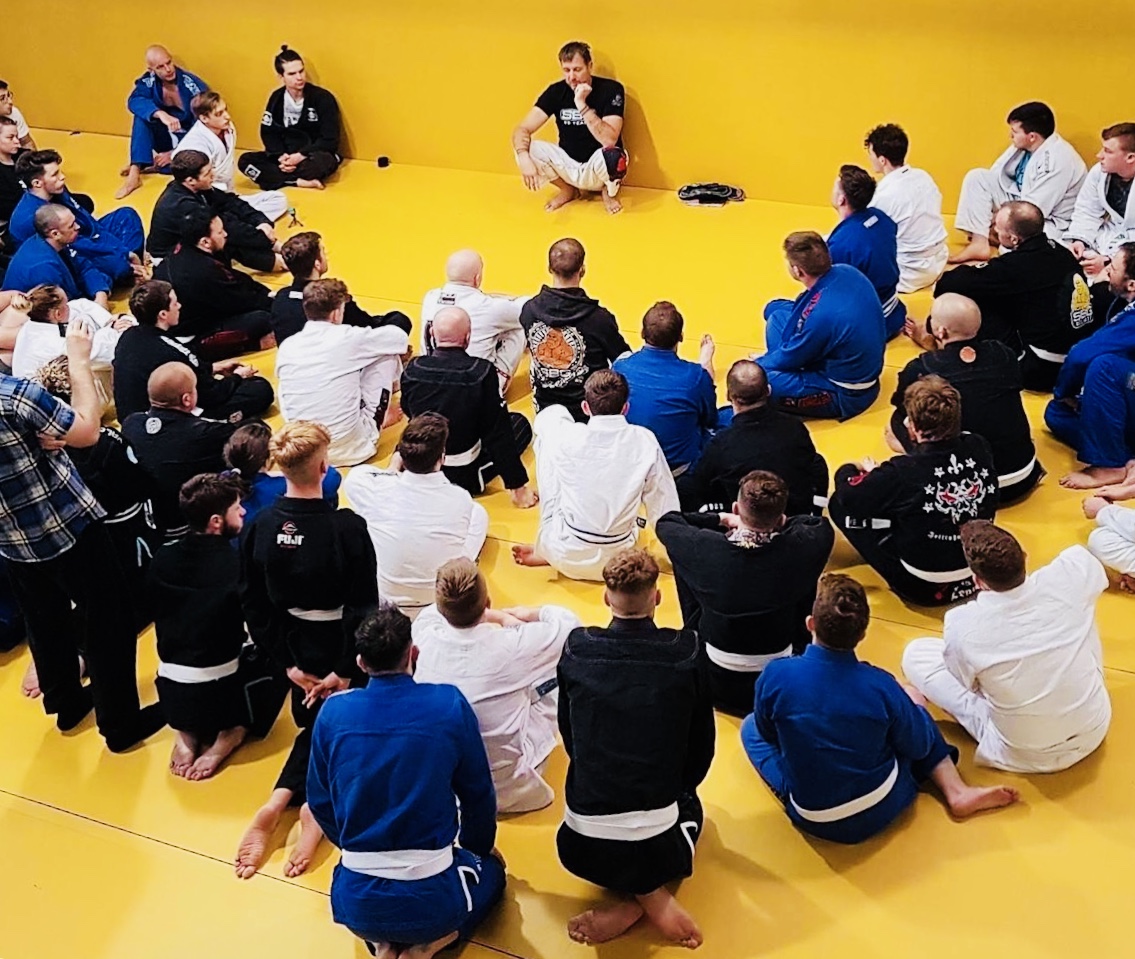Earlier this month I had the opportunity to train with Rickson Gracie black belt, Henry Akins. Henry’s been on my radar for a long time. We competed in the same tournament in the mid 90’s as blue belts, and over the last few years he is one of the very few Instructors whose online material I continually recommend.
The majority of instructional videos I run across tend to be things the black belts do themselves, their own game, or something that’s supposedly “new”; which seems to be a selling point for younger BJJ students who haven’t been around long enough to realize the cyclical nature of trends – and the fact that the creation of the ‘new’ is more often than not a result of not understanding the depth of the ‘old’.
Henry’s material is different. Like Rickson, I’ve yet to see anything Henry’s taught that I didn’t find important. And given the amount of time Henry spent with Rickson, that makes sense.
There is a generational dividing line in BJJ. The older, ‘old-school’ black belts, who’ve trained with Rickson, understand that there are regular black belts, there are good black belts, there are great black belts, there are world champion black belts – and then there is Rickson. The younger black belts, the ones who’ve never trained or worked with Rickson directly, have no way of knowing this first hand, and because of that, tend to be skeptical about the claim. That’s to be expected. Martial Arts are filled with legends, and they’re usually bullshit.
Henry was on the mats when world champions, in their prime, walked in, rolled with, and then quickly tapped to, Rickson – not just from submission, but sometimes, just the pressure of his weight. Henry had the advantage of witnessing this many times over. The net result is that he never gave up on the Jiu-Jitsu Rickson taught him. He never skipped past it, looking for the newest grappling fad. He never believed it wouldn’t work. He knew better. He knew that these fundamentals, done properly, with all the detail, base, posture, connection, and pressure they contain, were the reason Rickson could do what he did.
Those of you who follow SBG already know that Rickson’s influence was crucial in the early development of our philosophy and pedagogy. In fact it’s something he said, that led to me defining the term ‘Aliveness’ the way I did – and launching a life-long career. As I expressed to him myself last year, that’s something I will always be grateful for. Considering all that history, it’s fairly unsurprising that I agree with Henry on the things that matter most in Jiu-Jitsu. But what was surprising is that even after 25 plus years of training Brazilian Jiu-Jitsu, even after teaching these fundamentals all around the world, I was still blown away by just how deep those fundamentals run – and how much I still have to learn.
There is nothing in the curriculum of Gracie/Brazilian Jiu-Jitsu I love more than core fundamentals. The base – posture – connection – and pressure that make everything else within the delivery system work; the technology that, when done properly, defines what efficiency in fighting looks like. That’s why I have often wondered why I see them taught so rarely. It is part of our ethos, our culture, in SBG. It is obvious that it is all Rickson ever taught, or teaches – and his black belts seemed to be immersed in it. And there are other brilliant instructors within the Gracie family and the larger BJJ community, who also make it their focus. But in total, we are greatly outnumbered by the flood of BJJ schools where the instructors teach their own games, the latest trends, and have a pedagogy that revolves around chains of movements, rather than depth of foundation. Why is that?
I think there are 3 primary reasons:
- They don’t know the fundamentals well.
- They think they know the fundamentals, but don’t.
- They think people want the ‘new’, and will be bored by the important.
The techniques of Brazilian Jiu-Jitsu and the Aliveness inherent in the process of rolling are so powerful, that even with fragile bedrock, you can build an operating infrastructure. Add in youth, strength, speed, and the ability to scramble, and you will get a fast paced, movement based game that will be dangerous to most everyone – except for those who’ve taken the time necessary to forge a sturdier foundation. This is why young, athletic, world champions in their 20’s would end up tapping several times over to an injured, 40 something Rickson Gracie – fundamentals, not always what’s most basic, but always what’s most important.
If an athlete is winning consistently, and in an environment where he or she is competitive with the other best players, they may conclude that they have good fundamentals. The extent to which all of us learn to patch up weak areas of foundational structure with physicality is usually least apparent to us. It takes an outside observer to notice. And that requires an outside observer who knows the fundamentals at a level deeper than we do. In the environments that lack such an observer, tapping to a submission, or getting your guard passed repeatedly, results in a kind of evolution, one movement is replaced with another, or a new movement is added on – the whole ‘movement chain’ becomes longer. This is the opposite of efficiency, but if it works, it will assumed to be progress. Much of what I see being sold as ‘new’, next-level Jiu-Jitsu, is really just a flowering of a limb, which, if the fundamentals were better understood, wouldn’t have sprouted to begin with.
The final reason curriculum’s based on the fundamentals are rare, is because even coaches who are well versed in them, seem to believe that the students in their seminars and classes will be bored by them. Students want the newest game being taught, the leg lock flows, the latest technique from today’s gold medal competitors, the flashy submission – I can’t tell you how many times I’ve heard that. It is always an excuse. The coach might be bored with teaching the fundamentals, but if you’re a good teacher, the students never are. I’ve said this many times to my own black belts, and sometimes even they don’t believe me. The success of teachers like Henry is a testament to the fact I am right. Want the latest ‘thing’, it’s on YouTube, and everyone is showing it. Want to learn some crucial detail about base and posture inside that closed guard that even after almost three decades of training you seemed to have missed? That requires someone like Henry. It’s rare and therefore hard to find – and it’s incredibly valuable. Young students who are new to BJJ and don’t know what they don’t know may not understand the distinction, but if you’re a professional who takes your job seriously, you should know that part of your job involves helping them grasp it.
One final point I need to add here. It isn’t always fair to lay full blame for the absence of good instruction on the fundamentals at the feet of the individual teachers. Much of what I am talking about when I use the word fundamental was kept secret by various factions of the Gracie family, as the art made its way into the United States. Even among the Gracie brothers themselves, secrets were held close. Students of Rickson weren’t allowed to train with students of Rorion, and vice verse. The Gracie family under the tutelage of Helio, was hyper competitive, even between brothers. We can talk about how healthy that dynamic is or isn’t within a family, but I don’t think there is any doubt that for a field of knowledge, it’s a negative. Bridge building didn’t evolve because engineers kept their calculations hidden from each other. At some point people have to start thinking about the art itself. I think this happens more when an Instructor passes the age of competition. I think this is where Rickson is at now. If he doesn’t pass on his understanding of the fundamentals, it may get lost, or at the very least buried in the sea of regular Brazilian Jiu-Jitsu that’s becoming ubiquitous.
You cannot consciously, intentionally, evolve beyond what you don’t know. You can’t innovate past a structure you’ve yet to understand. True evolution, not revolution: the perpetual turning of the same wheel, but evolution: progress towards a more efficient delivery system, only occurs when the younger generation of black belts is given full and complete access to the knowledge and wisdom of the previous generations of black belts. The younger black belts have to be humble enough to learn, absorb, and understand the material, before they can even begin thinking about ‘advancing’ it. And the older black belts have to be open enough to teach it.
It’s not to say Rickson’s version of the fundamentals is perfect and beyond improvement. To the contrary, modern astrophysics isn’t perfect and beyond improvement, but it also isn’t improved by people who haven’t marinated in all the astrophysics we currently have. Coaches who have the hubris necessary to think they can improve on what Rickson’s does, but lack the real understanding about what Rickson does, will, at best, end up re-inviting the wheel – all the while engaging in a boring, narcissistic trip.
When I first met my coach Chris Haueter, I was overwhelmed by the detail he would share with me about something as simple as an armlock. What the left foot did, what the right foot did, what the knees were doing, what your arms and shoulders were doing, where you placed your other hand, there was a reason behind everything. He broke it down logically. You could learn an armlock by showing it briefly, and then having students do it – or you could go deep into an armlock, and try to understand why everything works the way it does. It’s only when you to the later than you become qualified to improve on it.
As the saying goes, I stand on the shoulders of giants. I didn’t invent the Jiu-Jitsu I teach. I’d be embarrassed to even imply that. I’m not some Martial Arts genius – far from it. I was introduced to it by Fabio Santos, received my foundational knowledge and philosophy about it from Rickson Gracie, went on to receive my purple, brown, black, and all the skill and information that goes along with that from my main coach, Chris Haueter – and have learned more about it every day since, from my fellow SBG brothers and sisters. What I know comes from them. And I am deeply grateful for their willingness to share that with me, and all that it’s allowed me to experience and do throughout my life.
After 28 years of practice, 17 years as a black belt, and thousands of hours teaching all over the planet, the most important thing I know about Jiu-Jitsu is how little I actually know. That’s why I will continue to work with my coaches, and other black belts who have a wealth of material to offer and are gracious enough to share it, like Henry Akins. That’s why myself and the other SBG coaches will continue to gather several times a year to share information and association with each other. And that’s why our organization will continue to advance. Not because I believe I am going to revolutionize Jiu-Jitsu, but rather, because I am smart enough to realize just how much Jiu-Jitsu I still have to learn.

